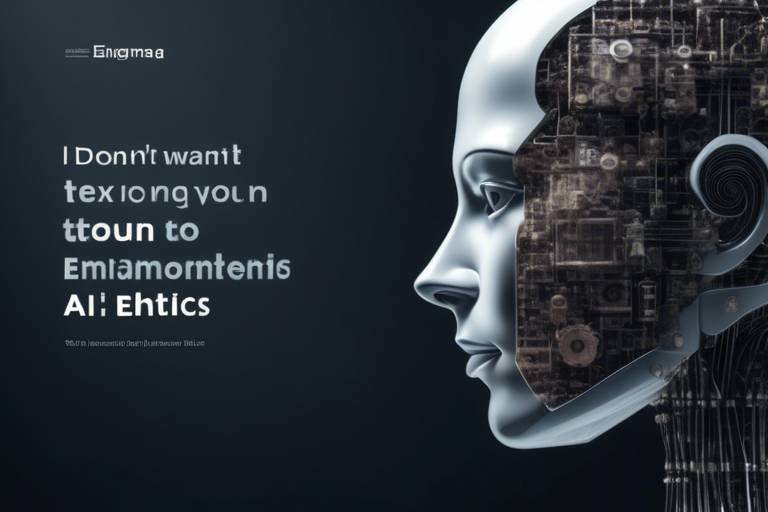Examining the Basic Ethics of AI
Artificial Intelligence (AI) is no longer just a concept from science fiction; it's a reality that's rapidly transforming our world. As we dive deeper into this technological revolution, it's essential to pause and consider the ethical implications that accompany such advancements. The integration of AI into various sectors—from healthcare to finance—brings with it not only immense potential but also significant challenges. How do we ensure that these powerful tools are used responsibly? What frameworks can we put in place to protect individuals and society as a whole? In this article, we will explore the fundamental ethical considerations surrounding AI, focusing on its implications for society, responsibility, fairness, and transparency in AI systems.
Understanding the significance of ethics in AI is crucial for its development and integration into society. Imagine a world where AI systems make decisions affecting your daily life without any oversight. Scary, right? This is why we need to ensure that technology serves humanity positively while mitigating potential risks and harms. AI ethics is not just a buzzword; it's a necessity. By prioritizing ethical considerations, we can create systems that not only enhance efficiency but also uphold human dignity and rights. It’s all about striking a balance between innovation and responsibility, ensuring that as we push the boundaries of what’s possible, we do so with a firm moral compass guiding us.
Several essential ethical principles guide AI development, shaping responsible practices that can benefit society. These principles include:
- Fairness: Ensuring that AI systems treat all individuals equitably.
- Accountability: Holding developers and organizations responsible for their AI systems.
- Transparency: Making AI decision-making processes clear and understandable.
- Respect for Privacy: Safeguarding personal data and ensuring user confidentiality.
By adhering to these principles, we can work towards creating AI technologies that not only perform efficiently but also align with our societal values.
Fairness is a cornerstone of ethical AI. It's crucial to prevent bias and discrimination, ensuring that algorithms treat all individuals equitably, regardless of race, gender, or socioeconomic status. But how do we achieve fairness in a realm often dominated by data? The answer lies in understanding that algorithms are only as good as the data fed into them. If the data reflects societal biases, the AI will inevitably perpetuate those biases. This is why addressing algorithmic bias is essential for creating just AI systems that uphold ethical standards. It’s like teaching a child; if they only learn from biased sources, their understanding of the world will be skewed.
Algorithmic bias can lead to unfair outcomes, affecting real lives. For example, biased algorithms in hiring processes can disadvantage qualified candidates simply because of their background. Therefore, identifying and mitigating these biases is essential. This involves:
- Conducting regular audits of AI systems to identify potential biases.
- Incorporating diverse perspectives during the development process.
- Utilizing algorithms that can adapt and learn from diverse data sets.
By implementing these strategies, we can work towards more equitable AI systems.
Implementing strategies like diverse data sets and inclusive design processes can enhance fairness in AI, promoting equitable outcomes across different demographics. It’s crucial to involve a wide range of voices in the development process, from engineers to ethicists, to ensure that AI reflects the complexity of human society. Think of it as assembling a team for a project; the more diverse the team, the richer the ideas and solutions.
Establishing accountability in AI development is vital. It ensures that creators and organizations take responsibility for the consequences of their technologies. Just like a ship captain is responsible for their crew, AI developers must be held accountable for the systems they create. This means establishing clear lines of responsibility and ensuring that there are mechanisms in place for users to report issues or concerns regarding AI systems.
Transparency in AI systems fosters trust and understanding among users, allowing them to comprehend how decisions are made and the data involved. Imagine if you had no idea how a doctor diagnosed your illness or how a bank approved your loan; it would feel unsettling, right? The same applies to AI. Transparency helps demystify AI processes, making them more accessible and trustworthy.
Explainable AI aims to clarify how algorithms arrive at decisions, which is essential for users to trust and accept AI recommendations in critical areas. Providing users with insights into the decision-making process can significantly enhance their confidence in AI systems. It’s like having a friend explain their reasoning behind a suggestion; it makes the advice more relatable and trustworthy.
Developing regulatory frameworks for AI can help enforce ethical standards, ensuring that AI technologies operate within established guidelines that prioritize human rights and societal welfare. Just as we have laws governing human behavior, similar regulations should apply to AI development and deployment. This can help prevent misuse and ensure that AI serves as a tool for good, rather than a source of harm.
- What is AI ethics? AI ethics refers to the moral principles guiding the development and implementation of artificial intelligence technologies.
- Why is fairness important in AI? Fairness is crucial to prevent bias and discrimination, ensuring equitable treatment of all individuals by AI systems.
- How can we ensure accountability in AI? Establishing clear lines of responsibility and mechanisms for reporting issues can help ensure accountability in AI development.
- What role does transparency play in AI? Transparency fosters trust and allows users to understand how AI systems make decisions, enhancing acceptance and reliability.

The Importance of AI Ethics
In today's rapidly evolving technological landscape, understanding the significance of ethics in artificial intelligence (AI) cannot be overstated. As we integrate AI into various aspects of our lives, from healthcare to finance, it becomes crucial to ensure that these systems are designed and implemented in a way that positively impacts society. Imagine a world where machines make decisions that affect our daily lives—wouldn't you want those decisions to be fair and just? That's where AI ethics come into play.
Ethics in AI serves as a guiding framework, helping developers and organizations navigate the complex moral landscape associated with their creations. By prioritizing ethical considerations, we can foster a technology that not only enhances efficiency but also respects human rights and dignity. This is vital because, without a solid ethical foundation, AI could inadvertently perpetuate biases, invade privacy, or even cause harm. For instance, consider the potential consequences of an AI system used in hiring processes—if not designed with fairness in mind, it could reinforce existing inequalities.
Moreover, the importance of AI ethics extends beyond just individual applications. It shapes the broader societal implications of technology. When we talk about AI ethics, we’re not merely discussing rules and guidelines; we’re addressing the fundamental question of responsibility. Who is accountable when an AI system makes a mistake? By establishing clear ethical standards, we can ensure that creators take responsibility for their technologies and their consequences.
In a world increasingly dominated by algorithms, transparency becomes another critical component of AI ethics. Users need to understand how decisions are made and what data is used. This transparency builds trust and allows individuals to engage with AI systems more confidently. Think of it like a recipe: if you don’t know the ingredients, how can you trust the dish? Therefore, ethical AI practices must include mechanisms for users to comprehend the workings of these systems.
In summary, incorporating ethics into AI development is not just a nice-to-have; it’s a necessity. It ensures that technology serves humanity positively while mitigating potential risks and harms. As we continue to innovate, let’s make sure that our ethical compass guides us, ensuring that AI remains a tool for good rather than a source of division or harm.

Key Ethical Principles
The world of artificial intelligence (AI) is not just about algorithms and data; it’s also deeply intertwined with ethics. As we plunge deeper into this technological age, understanding the key ethical principles that guide AI development becomes crucial. These principles serve as a compass, ensuring that as we innovate, we do so responsibly and with humanity at the forefront. The fundamental ethical principles include fairness, accountability, transparency, and respect for privacy. Each of these principles plays a significant role in shaping how AI interacts with society and the impact it has on our lives.
First and foremost, fairness is essential in AI. In a world where technology can easily reflect and amplify existing biases, it’s vital that AI systems treat individuals equitably. This means that regardless of race, gender, or socioeconomic status, everyone should receive fair treatment from AI algorithms. Imagine a world where a job application is evaluated not by the candidate's qualifications but by their name or background; that’s the danger of bias in AI. By prioritizing fairness, we can work to prevent these scenarios from becoming a reality.
Next, we have accountability. Who is responsible when an AI system makes a mistake? Is it the developer, the organization, or the AI itself? Establishing clear lines of accountability ensures that those who create and deploy AI systems are held responsible for their outcomes. It’s like being a chef in a restaurant; if the dish doesn’t turn out well, the chef must take responsibility for it, not the ingredients. This principle encourages a culture of responsibility where creators are mindful of the potential consequences of their technologies.
Then there’s transparency. In an age where we rely heavily on AI for decision-making, it’s vital that users understand how these decisions are made. Transparency fosters trust and allows users to comprehend the processes behind AI systems. For instance, if a healthcare AI recommends a treatment, patients should know how the algorithm arrived at that conclusion. This not only builds trust but also empowers users to make informed decisions about their lives.
Lastly, we must consider respect for privacy. In a digital world where data is the new oil, protecting personal information is paramount. AI systems often require vast amounts of data to function effectively, but this data must be handled with care. Just as you wouldn’t want someone rummaging through your personal belongings without your consent, individuals should have control over their data. This principle advocates for robust data protection measures, ensuring that individuals' privacy is respected and safeguarded.
To summarize, the key ethical principles of AI—fairness, accountability, transparency, and respect for privacy—are foundational to the responsible development and deployment of AI technologies. By adhering to these principles, we can ensure that AI serves humanity positively, mitigating risks and promoting a future where technology enhances our lives rather than complicates them.
- What is AI ethics? AI ethics refers to the moral implications and responsibilities associated with the development and use of artificial intelligence technologies.
- Why is fairness important in AI? Fairness is crucial to prevent bias and discrimination, ensuring that AI systems treat all individuals equitably.
- How can accountability be established in AI? Accountability can be established by defining clear responsibilities for developers and organizations regarding the outcomes of their AI systems.
- What does transparency in AI mean? Transparency in AI means making the processes and decisions of AI systems understandable to users, fostering trust and informed decision-making.
- How can privacy be protected in AI? Privacy can be protected by implementing robust data protection measures and ensuring individuals have control over their personal information.

Fairness in AI
Fairness in artificial intelligence (AI) is not just a buzzword; it is a critical pillar that underpins the ethical development of technology. Imagine a world where algorithms dictate the course of our lives—deciding who gets a loan, who is hired for a job, or even who receives medical treatment. If these algorithms are biased, the consequences can be severe, leading to discrimination and perpetuating existing inequalities. Therefore, ensuring that AI systems treat all individuals equitably, regardless of race, gender, or socioeconomic status, is paramount.
To truly grasp the importance of fairness in AI, we must first understand what we mean by "bias." Bias can creep into AI systems in various ways, often stemming from the data used to train these algorithms. For instance, if an AI system is trained on historical data that reflects societal biases, it will likely replicate those biases in its decisions. This is akin to teaching a child using outdated textbooks filled with inaccuracies; the child will grow up with a distorted view of the world. Hence, addressing algorithmic bias is not just a technical challenge; it is a moral imperative that requires our immediate attention.
One effective way to combat bias in AI is through the implementation of diverse data sets. By ensuring that the data used to train AI systems is representative of all demographics, we can create algorithms that are more inclusive. Additionally, adopting an inclusive design process that actively seeks input from diverse groups can help identify potential biases before they become embedded in the system. This proactive approach is crucial for promoting equitable outcomes across different demographics and fostering a sense of trust between AI systems and the communities they serve.
Another strategy involves the development of fairness metrics that can help evaluate the performance of AI systems. These metrics can provide insights into how well an algorithm is performing across different groups, highlighting any disparities that may exist. For instance, consider a loan approval algorithm that disproportionately favors one demographic over another. By applying fairness metrics, developers can identify and rectify these issues, ensuring that the algorithm functions fairly for everyone.
In summary, fairness in AI is not merely an ethical consideration; it is essential for the integrity of our technological future. As we continue to integrate AI into our daily lives, we must remain vigilant in our efforts to ensure that these systems are fair, just, and equitable. The stakes are high, and the responsibility lies with all of us—developers, organizations, and users alike—to advocate for fairness in AI. After all, in a world increasingly governed by algorithms, we must ensure that these algorithms reflect the best of humanity, not its worst.
- What is fairness in AI? Fairness in AI refers to the principle that AI systems should treat all individuals equitably, without discrimination based on race, gender, or other factors.
- Why is fairness important in AI? Fairness is crucial to prevent bias and discrimination, ensuring that AI systems do not perpetuate existing inequalities in society.
- How can we address algorithmic bias? Addressing algorithmic bias can involve using diverse data sets, implementing fairness metrics, and adopting inclusive design processes during AI development.
- What role do developers play in ensuring fairness? Developers are responsible for creating algorithms that are fair and just, which includes identifying and mitigating biases in the data and design processes.

Addressing Algorithmic Bias
Algorithmic bias is a pressing issue in the realm of artificial intelligence, and addressing it is not just a technical challenge—it's a moral imperative. When we think about algorithms, we often envision them as objective, cold calculations devoid of human emotion. However, these systems are built on data that reflects our society, which means they can inadvertently inherit our biases. This can lead to outcomes that are not only unfair but can also reinforce existing inequalities. So, how do we tackle this complex problem?
First and foremost, it’s critical to identify the sources of bias. Bias can seep into AI systems in various ways, from the data collection process to the design of the algorithms themselves. For instance, if an algorithm is trained on data that predominantly features one demographic, it may not perform well for others. This is akin to trying to fit a square peg into a round hole—no matter how hard you try, it just won’t work. By scrutinizing the data sets used in AI training, developers can pinpoint potential biases and take corrective action.
Next, we must embrace a multi-faceted approach to mitigate bias. This involves employing diverse data sets that represent a wide range of demographics, ensuring that the AI learns from a balanced perspective. Furthermore, incorporating an inclusive design process that involves voices from different backgrounds can lead to more equitable outcomes. For example, when developing facial recognition technology, including individuals from various ethnicities and genders during the training phase can significantly reduce bias in recognition accuracy.
To illustrate the impact of algorithmic bias, consider the following table that summarizes some common examples:
| Type of Algorithm | Potential Bias | Consequences |
|---|---|---|
| Hiring Algorithms | Favoring candidates from specific demographics | Exclusion of qualified candidates from diverse backgrounds |
| Predictive Policing | Over-policing certain neighborhoods | Reinforcement of negative stereotypes and community distrust |
| Credit Scoring | Discrimination against low-income applicants | Increased financial inequality and lack of access to loans |
Addressing algorithmic bias is not a one-time fix; it requires ongoing vigilance and adaptation. Developers and organizations must regularly audit their algorithms, ensuring that they remain fair and equitable as societal norms evolve. This is where accountability comes into play. By establishing clear guidelines and responsibilities, we can create a culture of ethical AI development that prioritizes fairness and justice over mere efficiency.
In conclusion, tackling algorithmic bias is essential for the creation of just AI systems. It’s a collaborative effort that demands the input of diverse stakeholders, ongoing education, and a commitment to transparency. As we continue to integrate AI into our daily lives, let us be vigilant in our efforts to ensure that these technologies serve all members of society fairly and equitably.
- What is algorithmic bias? Algorithmic bias refers to systematic and unfair discrimination in the outputs of AI systems, often resulting from biased training data or flawed algorithms.
- How can we identify algorithmic bias? Identifying algorithmic bias involves analyzing the data sets used for training, conducting audits on AI outputs, and engaging with diverse groups to understand their experiences with AI systems.
- What are some strategies to mitigate algorithmic bias? Strategies include using diverse data sets, involving a wide range of stakeholders in the design process, and regularly auditing AI systems for fairness.
- Why is addressing algorithmic bias important? Addressing algorithmic bias is crucial to ensure that AI technologies do not perpetuate existing inequalities and that they serve all members of society fairly.

Strategies for Fair AI
When it comes to ensuring fairness in artificial intelligence, the road can be a bit bumpy. However, by implementing effective strategies, we can pave the way for a more equitable future. One of the primary strategies is the use of diverse data sets. Imagine trying to paint a picture using only one color; it would be bland and unappealing. Similarly, AI systems trained on homogeneous data can lead to biased outcomes. By incorporating a wide variety of data that reflects different demographics, we can create algorithms that understand and serve all segments of society.
Moreover, inclusive design processes are essential. This means involving people from various backgrounds in the development phase. Think of it as gathering a group of friends with different tastes to decide on a movie to watch. Each person's perspective adds value, ensuring that the final choice is something everyone can enjoy. In the context of AI, this collaborative approach can help identify potential biases early on, allowing developers to make necessary adjustments before deployment.
Another effective strategy is continuous monitoring and evaluation of AI systems. Just as we wouldn’t drive a car without checking the brakes regularly, we shouldn’t allow AI to operate without oversight. By establishing mechanisms for ongoing assessment, organizations can catch biases as they arise and correct them swiftly. This proactive approach not only helps maintain fairness but also builds trust among users who rely on these technologies.
Furthermore, fostering a culture of ethical awareness within organizations is crucial. Training employees about the implications of AI and the importance of fairness can create a ripple effect. When everyone understands the stakes, they are more likely to prioritize ethical considerations in their work. It’s like teaching a child the importance of sharing; it becomes second nature over time. Organizations should also consider forming ethics committees to oversee AI projects, ensuring that fairness remains a top priority throughout the development lifecycle.
Lastly, engaging with the community and stakeholders can provide invaluable insights. By soliciting feedback from those who will be affected by AI systems, developers can better understand the potential impacts. Think of it as setting up a suggestion box; the more input you receive, the more informed your decisions will be. This engagement can lead to more responsible AI practices that genuinely reflect the needs and values of society.
In summary, the strategies for achieving fairness in AI are multifaceted and require a concerted effort from all involved. By leveraging diverse data sets, fostering inclusive design, maintaining continuous oversight, cultivating ethical awareness, and engaging with the community, we can create AI systems that are not only efficient but also just and equitable.
- What is fairness in AI? Fairness in AI refers to the principle that algorithms should treat all individuals equitably, without bias based on race, gender, or other characteristics.
- Why is diverse data important? Diverse data helps ensure that AI systems can understand and cater to different demographic groups, preventing biased outcomes.
- How can organizations monitor AI for fairness? Organizations can implement continuous evaluation processes, including audits and user feedback, to identify and address biases in AI systems.
- What role does community engagement play? Engaging with the community allows developers to gather insights and feedback, ensuring that AI systems meet the needs and values of the people they serve.

Accountability and Responsibility
In the rapidly evolving landscape of artificial intelligence, the concepts of accountability and responsibility take center stage. As AI technologies become more ingrained in our daily lives, the question arises: who is truly responsible for the decisions made by these systems? Is it the developers, the organizations that deploy them, or the algorithms themselves? This dilemma emphasizes the need for clear lines of accountability to ensure that ethical standards are upheld throughout the AI development process.
To understand the importance of accountability in AI, we must first recognize the potential consequences of AI decisions. From autonomous vehicles making split-second choices on the road to AI systems determining loan approvals, the stakes are incredibly high. If something goes wrong, the implications can be severe, affecting lives, livelihoods, and trust in technology. Thus, establishing accountability mechanisms is not just a matter of ethics; it’s a necessity for fostering public trust and ensuring the responsible use of technology.
One effective way to ensure accountability is through the implementation of clear guidelines and regulatory frameworks. These frameworks can help delineate the responsibilities of AI developers and organizations, ensuring that they are held accountable for the outcomes of their systems. For example, organizations could be required to conduct regular audits of their AI systems to assess their performance and fairness, thereby promoting a culture of responsibility. Such audits can also help identify any potential biases or ethical concerns that may arise during the AI’s operation.
Moreover, the concept of accountability should also extend to the data used in AI training. Data is the lifeblood of AI systems, and its quality directly impacts the outcomes of AI decisions. Developers must take responsibility for ensuring that the data is not only accurate but also representative of diverse demographics. This means actively seeking out and mitigating any biases that may exist in the data sets. By doing so, organizations can prevent harmful stereotypes from being perpetuated and ensure that their AI systems operate fairly.
In addition to establishing accountability frameworks, organizations should also embrace a culture of transparency. When users understand how AI systems make decisions, they are more likely to trust the technology. This transparency can be achieved through various means, such as providing clear documentation on how algorithms function and the data they utilize. When users have insight into the decision-making process, it empowers them to hold organizations accountable for the outcomes of those decisions.
As we delve deeper into the implications of accountability in AI, it’s essential to recognize that this is not just a technical issue; it’s a societal one. We need to engage in conversations about the ethical implications of AI technologies and involve diverse stakeholders in these discussions. By fostering a collaborative environment that includes ethicists, technologists, policymakers, and community members, we can develop more comprehensive solutions that prioritize accountability and responsibility in AI.
In conclusion, accountability and responsibility in AI are critical for ensuring that these technologies serve humanity positively. By establishing clear guidelines, promoting transparency, and engaging diverse stakeholders, we can create a future where AI systems operate ethically and justly. The road ahead is challenging, but with a concerted effort, we can build an AI landscape that embodies the principles of accountability and responsibility.
- What is accountability in AI? Accountability in AI refers to the responsibility of developers and organizations to ensure that their AI systems operate ethically and fairly.
- Why is accountability important in AI? Accountability is crucial to build trust in AI technologies and to ensure that they do not cause harm to individuals or society.
- How can organizations ensure accountability in AI? Organizations can ensure accountability by implementing regulatory frameworks, conducting regular audits, and being transparent about their AI systems.
- What role does data quality play in AI accountability? The quality of data used in AI training significantly impacts the fairness and accuracy of AI decisions, making it essential for organizations to take responsibility for their data.

Transparency in AI Systems
In today’s rapidly evolving technological landscape, is not just a luxury; it’s a necessity. Imagine trying to navigate a complex maze without a map. That’s what it feels like for many users when they interact with AI technologies that operate behind opaque algorithms. The lack of transparency can lead to mistrust and skepticism, hindering the widespread adoption of AI solutions. When users don’t understand how decisions are made, they are less likely to embrace these technologies, fearing potential biases or errors lurking in the shadows.
Transparency fosters trust and understanding among users, allowing them to comprehend how decisions are made and the data involved. This is particularly critical in sectors like healthcare, finance, and law enforcement, where AI decisions can significantly impact lives. For instance, if an AI system denies a loan application or recommends a medical treatment, users deserve to know the rationale behind such decisions. This not only empowers users but also holds organizations accountable for their AI systems.
One of the core aspects of transparency is the concept of explainable AI. Explainable AI aims to demystify the decision-making processes of algorithms, providing insights into how inputs are transformed into outputs. This can be achieved through various methods, including:
- Visualizations that illustrate the decision pathways of algorithms.
- Documentation that outlines the data sources and methodologies used in AI systems.
- User-friendly interfaces that allow users to query the AI about its decisions.
Moreover, regulatory frameworks are emerging to enforce transparency standards in AI systems. These frameworks aim to ensure that AI technologies operate within established guidelines that prioritize human rights and societal welfare. For example, the European Union is actively working on regulations that require AI systems to be explainable and auditable. This is a significant step towards ensuring that AI serves the public interest while maintaining ethical standards.
In summary, transparency in AI systems is vital for building trust and facilitating informed user interactions. As we continue to integrate AI into various facets of our lives, the demand for clear, understandable, and accountable AI will only grow. It’s not just about making AI work; it’s about making it work for us, in a way that we can all understand and trust. The journey towards transparency is ongoing, but with collective effort from developers, organizations, and regulators, we can pave the way for a future where AI is both powerful and comprehensible.
Q1: Why is transparency important in AI?
A1: Transparency is crucial because it builds trust between users and AI systems. When users understand how decisions are made, they are more likely to accept and utilize AI technologies.
Q2: What is explainable AI?
A2: Explainable AI refers to methods and techniques that make the decision-making processes of AI systems understandable to humans, ensuring that users can see how and why decisions are made.
Q3: Are there regulations for AI transparency?
A3: Yes, various regulatory frameworks are being developed globally to enforce transparency standards in AI systems, ensuring they operate ethically and prioritize human rights.
Q4: How can organizations improve transparency in their AI systems?
A4: Organizations can improve transparency by implementing visualizations, providing thorough documentation, and creating user-friendly interfaces that allow users to understand AI decisions better.

Explainability of AI Decisions
When we talk about artificial intelligence, one of the most compelling aspects is its ability to make decisions at lightning speed. But have you ever stopped to wonder how these decisions are made? This is where the concept of explainability comes into play. Simply put, explainability in AI refers to the methods and processes used to make the workings of AI systems understandable to humans. Imagine trying to solve a complex puzzle without knowing the picture on the box; that’s how many users feel when they encounter AI-driven decisions without any explanation.
In the world of AI, transparency is not just a buzzword; it’s a necessity. Users need to trust the systems they interact with, especially when those systems are involved in critical areas such as healthcare, finance, or law enforcement. For instance, if an AI algorithm denies a loan application or suggests a medical treatment, the person affected deserves to know why that decision was made. This is where explainable AI shines, providing insights into the decision-making process and allowing users to make informed choices based on the AI's recommendations.
To illustrate this, consider the following key components of explainability:
- Clarity: The AI's reasoning should be clear enough for a layperson to understand.
- Justification: Users should receive a rationale for the AI's decision, detailing the factors that influenced it.
- Traceability: It should be possible to trace back the decision-making process to see how inputs led to outputs.
Moreover, the importance of explainability cannot be overstated. When users understand how decisions are made, they are more likely to trust and accept AI recommendations. This is particularly crucial in sectors where biases can have serious consequences. For example, if an AI system used in hiring practices is found to favor certain demographics over others, the lack of transparency can lead to significant societal backlash and legal ramifications. Thus, explainability is not just about making AI understandable; it’s about fostering accountability and ensuring ethical integrity.
As we move forward, the integration of explainable AI into our systems will likely require collaboration between technologists, ethicists, and policymakers. By establishing guidelines and best practices for AI explainability, we can create a framework that prioritizes user understanding and promotes ethical standards in AI development. This collaborative approach will pave the way for a future where AI systems are not just powerful, but also transparent and trustworthy.
- What is explainable AI? Explainable AI refers to methods that make the decision-making processes of AI systems understandable to humans.
- Why is explainability important? Explainability is crucial for building trust in AI systems, especially in sensitive areas like healthcare and finance.
- How can we improve AI explainability? By implementing clear guidelines, utilizing user-friendly interfaces, and fostering collaboration among stakeholders, we can enhance AI explainability.

Regulatory Frameworks
This article explores the fundamental ethical considerations surrounding artificial intelligence, including its implications for society, responsibility, fairness, and transparency in AI systems.
Understanding the significance of ethics in AI is crucial for its development and integration into society, ensuring that technology serves humanity positively while mitigating potential risks and harms.
This section outlines essential ethical principles guiding AI development, including fairness, accountability, transparency, and respect for privacy, which help shape responsible AI practices.
Fairness is crucial in AI to prevent bias and discrimination, ensuring that algorithms treat all individuals equitably regardless of race, gender, or socioeconomic status.
Algorithmic bias can lead to unfair outcomes; therefore, identifying and mitigating these biases is essential for creating just AI systems that uphold ethical standards.
Implementing strategies like diverse data sets and inclusive design processes can enhance fairness in AI, promoting equitable outcomes across different demographics.
Establishing accountability in AI development is vital to ensure that creators and organizations take responsibility for the consequences of their technologies.
Transparency in AI systems fosters trust and understanding among users, allowing them to comprehend how decisions are made and the data involved.
Explainable AI aims to clarify how algorithms arrive at decisions, which is essential for users to trust and accept AI recommendations in critical areas.
As artificial intelligence continues to evolve and permeate various aspects of our lives, the need for robust becomes increasingly apparent. These frameworks serve as guiding principles that ensure AI technologies are developed and implemented in a manner that prioritizes ethical considerations and protects human rights. Without such regulations, the potential for misuse or unintended consequences of AI systems could lead to significant societal challenges.
Regulatory frameworks can vary widely across different regions and countries, reflecting local values, legal traditions, and societal needs. For instance, the European Union has been proactive in establishing comprehensive regulations aimed at governing AI technologies. Their proposed AI Act categorizes AI applications based on risk levels and imposes stricter requirements on high-risk systems, ensuring that they meet ethical standards before being deployed.
In addition to governmental regulations, industry standards and guidelines can also play a crucial role in shaping responsible AI practices. Many organizations are now adopting self-regulatory measures, collaborating with stakeholders to develop ethical guidelines that govern AI development and usage. This collaborative approach can foster innovation while ensuring that ethical considerations remain at the forefront.
To illustrate the importance of regulatory frameworks, consider the following table that summarizes key aspects:
| Aspect | Description | Examples |
|---|---|---|
| Risk Assessment | Evaluating the potential risks associated with AI systems. | EU AI Act, ISO Standards |
| Accountability | Establishing who is responsible for AI decisions and outcomes. | Liability laws, Organizational policies |
| Transparency | Ensuring users understand how AI systems operate and make decisions. | Explainable AI initiatives, User documentation |
| Human Rights | Protecting individual rights and freedoms in the context of AI. | GDPR, Ethical AI frameworks |
Ultimately, the establishment of effective regulatory frameworks is not just about compliance; it’s about fostering a culture of responsibility and trust in AI technologies. As we navigate the complexities of AI, it's essential for all stakeholders—governments, organizations, and the public—to engage in ongoing dialogue and collaboration. This ensures that AI serves as a force for good, enhancing our lives while minimizing risks.
- What are the main goals of AI regulations? The primary goals include ensuring safety, promoting ethical standards, protecting human rights, and fostering public trust in AI technologies.
- How can individuals influence AI regulations? Individuals can participate in public consultations, advocate for ethical standards, and support organizations that promote responsible AI practices.
- Are there international standards for AI ethics? Various organizations are working towards establishing international guidelines, but regulations can vary significantly by region.
Frequently Asked Questions
- What are the basic ethical principles of AI?
The basic ethical principles of AI include fairness, accountability, transparency, and respect for privacy. These principles guide the development and deployment of AI technologies, ensuring they serve humanity positively and equitably.
- Why is fairness important in AI?
Fairness in AI is crucial because it helps prevent bias and discrimination. Algorithms must treat all individuals equitably, regardless of their race, gender, or socioeconomic status, to foster trust and ensure just outcomes.
- How can algorithmic bias be addressed?
Algorithmic bias can be addressed by identifying and mitigating biases in the data and design processes. Using diverse data sets and implementing inclusive design practices are effective strategies to enhance fairness and promote equitable AI systems.
- What does accountability mean in the context of AI?
Accountability in AI means that creators and organizations are responsible for the consequences of their technologies. Establishing clear lines of responsibility ensures that any negative outcomes can be addressed and rectified.
- Why is transparency important in AI systems?
Transparency in AI systems fosters trust among users. When people understand how decisions are made and the data involved, they are more likely to accept and trust AI recommendations, especially in critical areas like healthcare and finance.
- What is explainable AI?
Explainable AI refers to efforts to clarify how algorithms arrive at their decisions. This is essential for building trust, as users need to comprehend the rationale behind AI recommendations to feel confident in their use.
- How can regulatory frameworks help AI ethics?
Regulatory frameworks can enforce ethical standards in AI development and deployment. By establishing guidelines that prioritize human rights and societal welfare, these frameworks ensure that AI technologies operate responsibly and ethically.


















